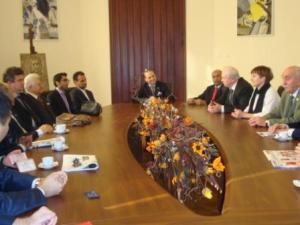On 12 April 2011 in a public ceremony , held in Bucharest at Aula Magna of Romanian Academy of Science, the world democratic community had rejoice to count a new member: Kazakhstan.

Democratic community had gathered to apllaude a new member : Kazakhstan
In the presence of diplomatic representatives of traditional democratic states, Professor Dr. Anton Caragea, president of European Council on International Relations and director of Institute of International Relations and Economic Cooperation of Romania , had presented the EU-Romanian Monitoring Report on Kazakhstan Presidential Elections. The ceremony was especially important as it was a double held ceremony Brussels- Bucharest, as the Romanian report was accepted as a European document and publicly presented in the same day by the European Council on International Relations as a European report.

Professor Anton Caragea is endorsing the Election Monitoring Report on Kazakhstan
The conference was open by Professor Dr.Anton Caragea presentation on the electoral supervision methods, objectives, electoral monitoring theory and electoral monitoring practice. Other speeches on behalf of members of European Union- Romanian team for election monitoring where held by Mr. Sali Negiat, undersecretary of state of Romanian Government and Mr. Gabriel Arsene, journalist. Then in a public ceremony , the Final Report of Election Monitoring Mission in Kazakhstan was presented and handed off to Mr. Kairat Aiman – Charge d`affairs of Kazakhstan.
Monitoring commission has under scrutiny the mass media law, the election law, the political laws and the Constitutional Law of Kazakhstan and had operated a surveillance of the measure taken by the Central Electoral Commission in order to insure a free and open election atmosphere.
The European union- Romanian monitoring mission insured also the Election Day supervision, the supervision of counting and tabulation of elections results in a significant and representative number of sections and commissions.

A crowded audience listen the lesson of the birth of a democracy : Kazakhstan
The report conclusion being that is endorsing the Kazakhstan elections as representing the free and democratically expressed voice of Kazakh people decision
In his speech H.E.Kairat Aiman had warmly appreciated European Union-Romanian election monitoring team for the special efforts and dedication, for the energy inputted into this mission and for the electoral monitoring report.
″Specially I was interested by the international observer`s opinion on the democratic progress of my country and I was enthusiast to learn that our elections have obtained the international community support as democratic. I appreciate Romanian efforts″ concluded Kazakhstan Charge d`affairs-Kairat Aiman.

The Diplomatic Corp is listening to Election Monitoring Report
A question and answer session followed for a half an hour and has touched on all the pending issues on presidential elections held on 3 of April in Kazakhstan.
The 12 April 2011 event had represented for Kazakhstan the certificate for democratic and free elections and a support in continuing democratic reforms and for European Union , Romania and world democratic community a moment of pride as a new member is affirming himself on democratic path: Kazakhstan.





























